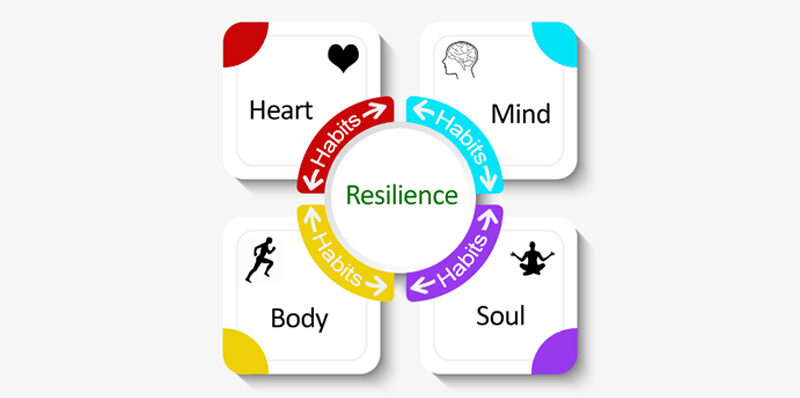What is resilience? Are some people just more resilient than others? Is resilience a personality trait?
Resilience is the quality that helps people adapt to a difficult situation as well as an ability that aids in growth, healing and recovery post any traumatic incident. It helps us face adversity and also stress. It is also the agility and flexibility that allow us to ‘move on’ from difficult situations – to continue to be present and attend to what is at hand, without the baggage of past experience. In lay terms, resilience is what helps one, “bounce back” and continue strongly.
In these times of Covid, we are all dealing with heightened uncertainty and volatility and this leads to sustained stress. Many of us feel physically depleted by the anxiety and the isolation. Yet others seem to continue to be creative and productive and happy through it all. As we see their feeds on social media, it is easy to believe that some people are just more resilient – that they have some sort of super power and so are able to go longer than the rest of us without feeling weighed under. But in reality, resilience is a process of adaptation and consists of behaviour, thought patterns and habits that anyone can adopt and practice. Further, the habits you adopt can also influence your personality over a period of time, changing how you view the world, your approach to task or people, etc. Then, resilience is simply like any muscle – with targeted training and regular exercise, it can be cultivated and made stronger.
How can this bounty of resilience be accessible to each one of us. Here are some elements to nurture as you think about replenishing your resilience reservoir. Through regular habits that strengthen these elements, you find yourself coping better with stress.
Body
Stress has not just a psychological impact but also a physical one. That is why, at the end of a long work day, we feel physically exhausted. There is a real connection between the body and the other elements. The body is the chassis within which everything else finds a place. Regular physical activity and exercise can help build stamina as well as capacity for handling stress. Research shows that expending energy physically can lower the stress hormone and increase the happy hormones in one’s body. So commit to an activity you do regularly – swimming, cycling, yoga, dance – even just a simple stroll done regularly can help you feel more restored.
Mind
Engage in exercises that stimulate you intellectually, problem solve and enjoy a sense of accomplishment. Presently, with so much beyond our control, we lose a sense of agency and that can feel both mentally and physically draining (akin to a loss). Learning new things can give you a sense of achievement. It can engage you and help you focus your energies and mind. This can be even small things like learning how to use a new app or tool, engaging in a hobby, reading something interesting. These can help in keeping you distracted or entertained and by learning a new skill, you can create new neural pathways that keep your brain active and healthy.
Heart
Replenishing emotionally and feeling socially connected are both critical to a sense of well-being. This may be simply done with a regular phone call to a friend and a good laugh or saying no to things that deplete you emotionally. Regulating emotion on a situational basis is really important to this. And this can be done in many ways from reducing consumption of social media (to manage for anxiety) or anger management techniques. Strong personal relationships are no doubt a great source of energy, but doing something compassionate or helping another person can be just as powerful for restoring emotional health.
Soul
Institute habits that reinforce your identity, self-worth and give you a chance to exercise your purpose. Journaling, meditating, self-reflection exercises all help in providing clarity regarding one’s multiple roles and in defining priorities. Another way is to try out projects that enable self-expression. Many artists during the lockdown have taken to creating content and putting it online for example. Others find their joy in charity work or other forms of social contribution. It can even be as simple an agenda as keeping your family and loved ones healthy through the crisis. And you may find that a lot of impact from such projects may stay with you well beyond the moment of stress.
Similar to how one goes to the gym to get fit, one can take a cross-training mind-set to help build resilience. You can start by mapping out which of the above mentioned four elements you feel most depleted in. Then, take that weak muscle and bring it back to functionality. For e.g., if you find yourself physically exhausted by the end of each day, build physical activity into your schedule to build stamina by engaging in exercise or reset your diet. If you feel disconnected, make it a regular ritual to call a loved one every day. If you feel helpless about things, take on a puzzle challenge and get a shot of accomplishment energy on completing it. With these small tweaks and habits, you can build yourself to better handle the maelstrom we find ourselves in at the moment.

